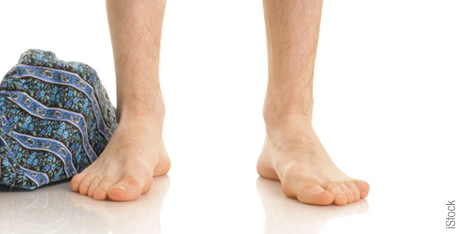I was exhausted. I couldn’t help cutting corners. And where there were no corners, I cut whatever was there. This fatigue, a symptom of my Parkinson’s, had saddled me with a repertoire of some bad but necessary habits. By bed time every night, I was so tired I pulled off my jeans and shorts at the same time, not bothering to separate them before dropping them in a heap on the floor.
One morning, I put on fresh shorts, then pulled on the same jeans, forgetting that the old shorts were still inside. I went to work as usual. Through the morning, the old shorts began working their way down the back of my right pant leg the way a piglet, swallowed by a python, slowly moves through the serpent’s gut. I had no idea this was happening. I felt tightness at the back of my thigh but assumed it was one of those dry jokes by which Parkinson’s only makes it seem you are developing yet another symptom.
At noon I left the office for lunch, walking up the carpeted hallway when the shorts finally made it out the bottom of my pant leg. Flew out is more like it, landing some ways down the hall at the feet of a woman just coming out her office door. My face burned hot and I realized something terrible: I was no longer cool.
One morning, I put on fresh shorts, then pulled on the same jeans, forgetting that the old shorts were still inside.
OK, I probably have not been cool or stylish since I hit 40. Despite the corrosive effect of simple aging in the decades since, I have managed to keep deluding myself that, if I wasn’t actually cool, the possibility still existed.
In my current shape — stumbling, slurring my words, kicking my underwear at strange women — only an idiot could think I was cool. Dignity was hard enough to come by; if I tried to be cool on top of that, I would surely make a jackass of myself.
The underwear had to go.
Perhaps it is true that people with class wear underwear, but wrestling with my shorts every morning exhausted me. I simply was not going to put up with it anymore. I threw out the worst of them and took the rest to Goodwill.
I felt purged, unburdened. This worked so well that I decided there were other nonessentials that could be given their walking papers.
Soon I identified the next item destined for the chopping block: dress shirts. Wearing fine shirts used to make me relaxed and confident; trying to button them with PD bled all that good feeling away. I made another trip to Goodwill. While there, I bought a number of serviceable T- and sweatshirts that were easier to wear and maintain than dress shirts. They quickly became part of what I thought of as my new uniform.
I was on a roll. Casting about for another likely target, my eye fell upon the general category of grooming, a breeding ground of useless style items.
For this next adjustment, I zeroed in on the particular scourge of shaving. I used to put a fairly high premium on shaving my face as closely as possible, especially when I was going out. For closeness, you needed a blade. An electric razor just wasn’t going to make it. With Parkinson’s, using a blade on my face had become the same kind of hell as buttoning shirts, only far more intimate. I had to brace my arms to minimize the effects (and the danger) of stiffness and shaking, moving my face against the razor instead of the other way around. All the effort began to seem empty. So, one day I dropped all my paraphernalia in the garbage and let my beard do what it would.
With Parkinson’s, using a blade on my face had become the same kind of hell as buttoning shirts, only far more intimate.
Initially there was the same exhilaration as with the shirts and underwear; the same sense of lightening my life, streamlining it. At the same time, I began to hear a voice in my head saying, If you keep this up, pretty soon there won’t be anything left.
What? Wait. Where did that chiding, finger-wagging tone come from? I was responding responsibly to an emergency in my life, for God’s sake! I was doing something positive about my situation.
Or was I?
Maybe I was simply trying to escape the pain of an ego that was tired of being bruised and battered by the embarrassing symptoms of my “dis-ease.”
Perhaps, unconsciously, I thought if I could edit the style elements out of my life – no matter how minor and unimportant they seemed – I could trick the ego into believing that none of it mattered, as if having style were a matter wholly of choice. Instead, style proved to be a separate entity, a living thing that did most of its important work while I wasn’t looking, while I believed, wrongheadedly, that I was making strides in a different direction.
Rather than discarding my style, I found myself revamping it. I started buying dress-style shirts at thrift shops, and now wear them unbuttoned and untucked over T-shirts, consciously avoiding clashing colors. I bought a trimmer for my beard, much more forgiving than razors. Making these changes allowed a trickle of the old confidence. For now, the ego is playing along.
Maintaining a sense of style when you’re dealing with a chronic illness is not only possible, it’s mandatory. Giving your ego even a mild workout can supply the vinegar your personality craves when depression seems to have bled all your resources dry. And when you do, your style can reflect these changes that sometimes, happily, appear out of the blue.



